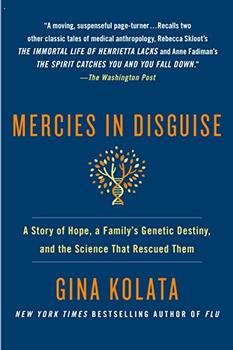Write your own review!
Carm D. (Omaha, NE)
Mercies in Disguise by Gina Kolata
I was not sure that I was going to like this book. It started out kind of clinical like a medical research book.
After that part was done it moved into a family with devastating genetic illness. It described how different family members coped with the knowledge once it was discovered.
It was a good book, it kept my attention and I would recommend this book to anyone who would like a sort of medical detective story.
I have not read any other stories like this, nor have I ever heard of the disease GSS.
My prayers to the family!
Deborah C. (Seattle, WA)
Would You Want to Know?
What if you carried a gene that meant that, when you reached middle age, you would develop a degenerative disease for which there is no cure. Would you want to find out whether you carried that gene? This book explores that question through the eyes of one extended family that has suffered from this disease for generations.
The author does a wonderful job of telling the stories of various family members at risk of or suffering from the disease. She also delves into the research that helped identify the disease and the gene that causes it. The book is both fascinating and heartbreaking to read.
This would be a great book for book clubs. The family members who have the option of genetic testing reach different decisions about whether to undergo that testing, and the reasons underlying these decisions provide really interesting topics for discussion. Plus, the book is very readable; I had a hard time putting it down!
Caryl L. (Richmond, VA)
Mercies in disguise
This is not a happy book; However, it is a hopeful book about a very serious subject. The author has written in language that the average non-scientific reader can follow and understand. Further, she has included the lives of a family (Baxley) affected, giving the reader people to identify with making the book more like reading a novel. But don't forget - these people are real.
The disease caused by a mutated brain cell is passed genetically from generation to generation with no cure. It leaves the victim totally incapacitated. The effects on the families are devastating. While research has found no cure, a procedure has been developed to fertilize eggs in the womb, remove them and discard the ones with the infected gene and re-implant the others. What a decision! To some. the decision would be in a sin. To others, a chance to stop this disease in its tracks. What would you do?
Additional notes: Robin Williams chose suicide. His wife has written a book about this mutated brain cell disease.
Several young people in Washington State have contracted a disease that leaves their limbs weakened and useless somewhat like polio; caused, researchers believe, by a mutated cell.
Alzheimer research has recently made some very promising discoveries in brain cell mutations.
Ruth H
Science vs. Religion
I really enjoyed this medical/ethics story. This family was full of surprises, especially about the decisions they would or didn't want to make. At times I laughed, sometimes I cried. The science side of this book taught me a lot about IVF/PGD; but also the religious ethic associated with the genetic disorder. Gina Kolata made me really think, "What would I have done if in this family's shoes?" Such a terrific ending, made me smile and cheer! Also appreciated the "Notes" section in back of book, makes me want to know more from medical reports and studies. All-in-all an easy read that is inspiring and educational.
Anna R. (Oak Ridge, TN)
Amazing
Wow! How brave Amanda is!! And so is her husband. The choices she must make are life changing. She did give her children such a gift. I felt for Merle, the mother in this family. How horrible for her to not only see her husband have the degenerative illness, but some of her children.
The medical part of this book were hard to get through, but the story of the family was riveting. I read this book in two days.
Paula J., Bath ME
Would you want to know?
"Mercies in Disguise" was very interesting and quick to read. I enjoy medical mysteries, and Kolata's writing kept me interested all the way though. What would make this book a '5' for me is deeper characterization of a few of the main characters. Kolata did a great job of explaining genetics and the family's illness; her writing is easy to understand and should be accessible to most.
Dorothy M. (Maynard, MA)
A Story of Hope
If you watched members of your family die from a terrible incurable hereditary disease and if there was a test to see if you carried the flawed gene that caused it - would you take that test? And if the result was positive, how would you live the rest of your life? These were not random questions for the Baxley family from a small town in South Carolina. As older members of the family began to display symptoms of an illness their doctors could not identify, it begins to be obvious that all the members of the family are at risk. Their story, interspersed with the work of the doctors and scientists who are attempting to identify and understand a disease that leaves previously healthy people unable to move or communicate, is a compelling read. Told from the point of view of Amanda, a young woman just beginning her life as a nurse with the man she plans to spend her life with, this is ultimately the story of the depth of the human spirit.
